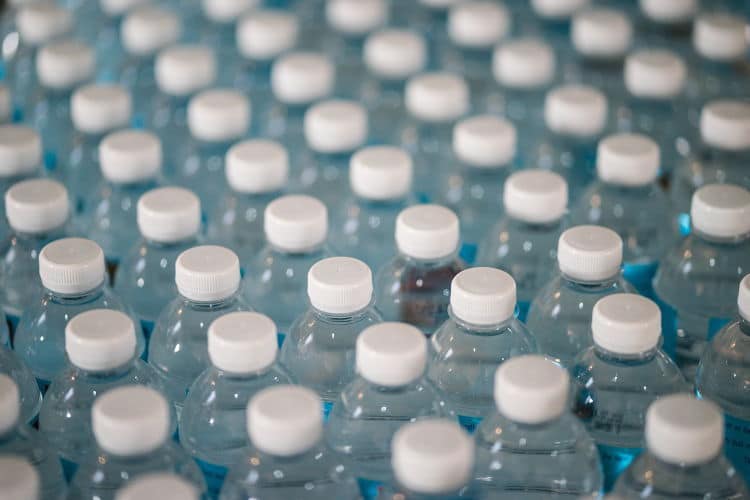(Anna Hunt) It’s common knowledge, these days, that the plastic ingredient bisphenol A, or BPA, can be harmful to your health. Although we don’t technically consume plastic, BPA present in food packaging can leach into our food and water. When consumed in trace amounts, it can affect hormone production, disrupt the endocrine system, and even lead to infertility.
Related Do You Know That Some of the Most Common Endocrine Disruptors Are Found in Your Kitchen?
by Anna Hunt,
When researchers discovered the problem with BPA, packaging suppliers were quick to introduce BPA-free alternatives. Unfortunately, we’re now finding out that the replacements they used may not have solved the problem at all. This may not be a huge surprise considering that BPA-free products still use other types of bisphenol. Now, scientists from Washington State University report that “replacement bisphenols produce remarkably similar chromosomal abnormalities to those seen so many years earlier in studies of BPA.”
Is BPA-free Any Better?
Scientists discovered the issues with BPA purely by accident about twenty years ago. The ingredient leached out of plastic cages that held female mice. The lab researchers quickly realized an unusual increase in reproductive abnormalities in these particular mice.
Coincidentally, the same team of researchers now reports that alternative bisphenols in BPA-free bottles and other food containers may cause similar problems. Similarly to their initial discovery, the researchers noticed unusual changes in control lab mice, following contamination from damaged cages.
Once the contamination was under control, Patricia Hunt of Washington State University headed up the team that took an in-depth look at the effects of replacement bisphenols. The researchers were able to confirm that replacement bisphenols produce similar reproductive abnormalities as in earlier studies on BPA.
Although the study evaluated mice, Hunt notes that the initial inadvertent exposure of their animals was remarkably similar to what might happen in people using plastics. The scenario in that the exposure was accidental and highly variable.
Solving the Problem of Leaching Plastic
If you want to protect yourself from the potentially-harmful bisphenols, you have to abstain from plastic food packaging and containers altogether. But let’s be honest. That’s easier said than done. Thus, here’s one very important rule of thumb. DO NOT USE plastics that show any visible signs of wear or aging, BPA-free or not. As well, never put hot foods or beverages in plastic containers or cups.
Buy Book Medication Madness: The Role of Psychiatric Drugs in Cases of Violence, Suicide, and Crime
Further, it’s fair to believe that some responsibility falls into the hands of plastics producers and food packagers. It makes one wonder that with technology now in place to offer clean and green alternatives, such as plastic bags made from 100% bio-based material, why aren’t corporations more proactive in ditching bisphenols altogether?
Hunt writes:
“The ability to rapidly enhance the properties of a chemical has tremendous potential for treating cancer, enhancing medical and structural materials, and controlling dangerous infectious agents,” the researchers write. “Importantly, this technology has paved the way for ‘green chemistry,’ a healthier future achieved by engineering chemicals to ensure against hazardous effects. Currently, however, regulatory agencies charged with assessing chemical safety cannot keep pace with the introduction of new chemicals. Further, as replacement bisphenols illustrate, it is easier and more cost effective under current chemical regulations to replace a chemical of concern with structural analogs rather than determine the attributes that make it hazardous.”
Buy Book The Male Brain: A Breakthrough Understanding of How Men and Boys Think
Buy Book The Female Brain
About the Author
Anna Hunt is writer, yoga instructor, mother of three, and lover of healthy food. She’s the founder of Awareness Junkie, an online community paving the way for better health and personal transformation. She’s also the co-editor at Waking Times, where she writes about optimal health and wellness. Anna spent 6 years in Costa Rica as a teacher of Hatha and therapeutic yoga. She now teaches at Asheville Yoga Center and is pursuing her Yoga Therapy certification. During her free time, you’ll find her on the mat or in the kitchen, creating new kid-friendly superfood recipes.
This article (BPA Free May Not Mean Safe – Researchers Link Alternatives to Bisphenols to Reproductive Abnormalities) was originally created and published by Waking Times and is published here under a Creative Commons license with attribution to Anna Hunt and WakingTimes.com. It may be re-posted freely with proper attribution, author bio, and this copyright statement.
Disclaimer: This article is not intended to provide medical advice, diagnosis or treatment. Views expressed here do not necessarily reflect those of Waking Times or its staff.
Not sure how to make sense of this? Want to learn how to discern like a pro? Read this essential guide to discernment, analysis of claims, and understanding the truth in a world of deception: 4 Key Steps of Discernment – Advanced Truth-Seeking Tools
Stillness in the Storm Editor’s note: Did you find a spelling error or grammar mistake? Send an email to [email protected], with the error and suggested correction, along with the headline and url. Do you think this article needs an update? Or do you just have some feedback? Send us an email at [email protected]. Thank you for reading.
Source:

Leave a Reply